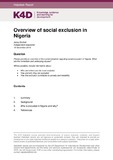Overview of Social Exclusion in Nigeria
Abstract
The concepts of poverty and social exclusion are intertwined but distinct from each other; not all members of socially disadvantaged groups are economically disadvantaged. However, social exclusion increases poverty by reducing groups’ access to vital services such as health, education and social protection, and to livelihood opportunities. At the same time, poverty increases social exclusion, when access costs to services mean that households cannot afford education and healthcare. Social exclusion is also a causal factor in conflict and instability, especially when exclusion is based on religion, ethnicity or language. When particular groups of people are denied the opportunity to fully participate, and have a voice in society, fractures and divisions arise. Social exclusion can also result as a consequence of conflict. Certain groups such as women and girls and people with disabilities are often further marginalised due to conflict and instability, while refugees and IDPs are marginalised in the place to which they move. There appears to be much more published evidence about social exclusion faced by women and girls and people with disabilities in Nigeria. Much of the literature on ethnicity and religion in Nigeria focuses on religious and ethnic identities as causal factors in conflict and instability, rather than as a reason for exclusion. There is less available evidence on social exclusion as experienced by older people, and on LGBT people’s experiences of social exclusion. What literature there is on this latter group tends to focus on gay and bisexual men and less on lesbians, bisexual women and female to male trans people.
Citation
Birchall, J. (2019). Overview of social exclusion in Nigeria. K4D Helpdesk Report. Brighton, UK: Institute of Development Studies.Is part of series
K4D Helpdesk Report;685Rights holder
© DFID - Crown copyright 2019Collections
- K4D [937]

